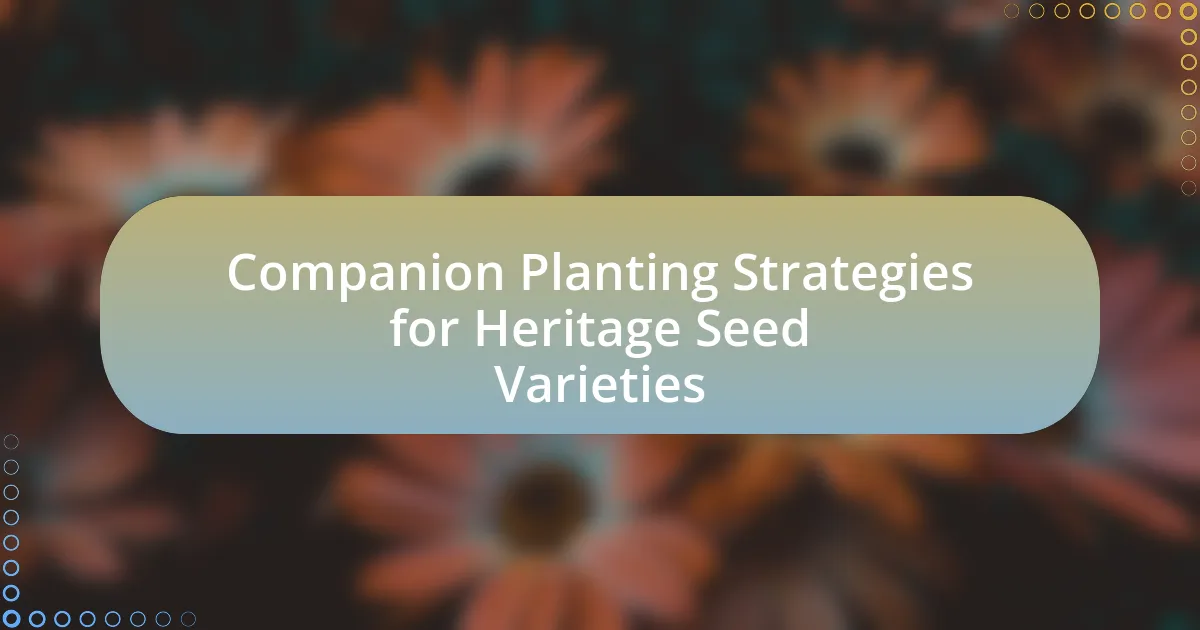Heritage seeds are traditional, open-pollinated seed varieties that have been preserved through generations, known for their adaptability, resilience, and genetic diversity. This article explores the significance of heritage seeds in sustainable agriculture, highlighting their role in promoting biodiversity, enhancing food security, and supporting local farming communities. It contrasts heritage seeds with hybrid and GMO seeds, emphasizing their advantages in terms of resilience to environmental changes and reduced dependency on chemical inputs. Additionally, the article discusses best practices for cultivating heritage seeds, the resources available for farmers, and the challenges faced in their use, ultimately underscoring the importance of heritage seeds in addressing modern agricultural challenges and fostering sustainable farming practices.

What are Heritage Seeds and Their Importance in Agriculture?
Heritage seeds are traditional seed varieties that have been passed down through generations, often characterized by their adaptability, resilience, and genetic diversity. These seeds are important in agriculture because they contribute to biodiversity, enhance food security, and support sustainable farming practices. For instance, heritage seeds can thrive in local conditions, reducing the need for chemical inputs and promoting soil health. Additionally, they preserve unique traits and flavors that are often lost in commercial seed varieties, thereby maintaining cultural heritage and agricultural history. The use of heritage seeds can also help farmers adapt to climate change by providing a wider range of options for cultivation.
How do Heritage Seeds differ from Hybrid and GMO Seeds?
Heritage seeds differ from hybrid and GMO seeds primarily in their genetic makeup and breeding methods. Heritage seeds are open-pollinated varieties that have been passed down through generations, maintaining genetic diversity and adaptability, while hybrid seeds are created through controlled cross-pollination of two different parent plants to produce specific traits, and GMO seeds are genetically modified organisms that have had their DNA altered in a laboratory to express desired characteristics. Heritage seeds often exhibit resilience to local growing conditions and can be saved and replanted by farmers, unlike hybrid seeds, which typically do not produce offspring with the same traits, and GMO seeds, which are often patented and require farmers to purchase new seeds each season. This distinction highlights the importance of heritage seeds in promoting biodiversity and sustainable agricultural practices.
What characteristics define Heritage Seeds?
Heritage seeds are defined by their open-pollinated nature, which allows them to be saved and replanted year after year without losing their genetic traits. These seeds are typically heirloom varieties, meaning they have been passed down through generations, often for at least 50 years, and are known for their adaptability to local growing conditions. Additionally, heritage seeds exhibit a diverse genetic makeup, which contributes to biodiversity in agriculture and resilience against pests and diseases. This genetic diversity is crucial for sustainable agriculture, as it supports ecosystem health and reduces reliance on chemical inputs.
Why are Heritage Seeds considered more resilient?
Heritage seeds are considered more resilient because they possess a diverse genetic makeup that enables them to adapt to varying environmental conditions. This genetic diversity allows heritage seeds to withstand pests, diseases, and climate fluctuations more effectively than modern hybrid seeds, which often have a narrower genetic base. Research has shown that crops grown from heritage seeds can yield better in adverse conditions, such as drought or poor soil quality, due to their ability to tap into a wider range of survival strategies.
What role do Heritage Seeds play in biodiversity?
Heritage seeds play a crucial role in biodiversity by preserving genetic diversity within plant species. These seeds, often heirloom varieties, maintain traits that are adapted to local environments, which enhances ecosystem resilience. For example, heritage seeds can contribute to the survival of various plant species by providing a wider gene pool, which is essential for breeding programs aimed at developing crops that can withstand pests, diseases, and climate change. Studies have shown that maintaining diverse seed varieties can lead to improved agricultural sustainability and food security, as diverse crops are less susceptible to widespread failure.
How do Heritage Seeds contribute to ecosystem health?
Heritage seeds contribute to ecosystem health by promoting biodiversity and resilience within agricultural systems. These seeds, which are open-pollinated and often heirloom varieties, support a diverse range of plant genetics that can adapt to local environmental conditions, thereby enhancing soil health and reducing the need for chemical inputs. Research indicates that diverse cropping systems, which include heritage seeds, can improve ecosystem services such as pest control, pollination, and nutrient cycling, leading to more sustainable agricultural practices. For instance, a study published in the journal “Agriculture, Ecosystems & Environment” found that farms utilizing diverse heritage seed varieties had higher levels of beneficial insects and improved soil quality compared to monoculture systems.
What is the significance of genetic diversity in crops?
Genetic diversity in crops is significant because it enhances resilience against pests, diseases, and environmental changes. This diversity allows for a wider range of traits that can be beneficial for adaptation and survival. For instance, a study published in the journal “Nature” by McCouch et al. (2013) highlights that diverse genetic backgrounds in crops can lead to improved yield stability under varying climatic conditions. Furthermore, genetic diversity supports food security by ensuring that crops can withstand biotic and abiotic stresses, thereby reducing the risk of total crop failure.
Why are Heritage Seeds essential for sustainable agriculture?
Heritage seeds are essential for sustainable agriculture because they promote biodiversity, resilience, and ecological balance in farming systems. These seeds are open-pollinated and have been passed down through generations, allowing farmers to cultivate crops that are well-adapted to local conditions. This adaptability leads to increased resistance to pests and diseases, reducing the need for chemical inputs. According to a study by the Food and Agriculture Organization, heritage seeds can enhance food security by providing a diverse range of crops that can withstand climate variability. Additionally, heritage seeds contribute to the preservation of genetic diversity, which is crucial for the long-term sustainability of agricultural ecosystems.
How do Heritage Seeds support local farming communities?
Heritage seeds support local farming communities by preserving biodiversity and promoting sustainable agricultural practices. These seeds are often adapted to local climates and conditions, which enhances resilience against pests and diseases. For example, studies show that farms using heritage seeds can achieve higher yields and better quality produce due to their adaptability. Additionally, heritage seeds encourage local farmers to maintain traditional farming methods, fostering community knowledge and cultural heritage. This practice not only strengthens local economies but also contributes to food sovereignty, allowing communities to control their food sources and agricultural practices.
What economic benefits do Heritage Seeds provide to farmers?
Heritage seeds provide farmers with significant economic benefits, primarily through cost savings and increased market opportunities. By using heritage seeds, farmers can save money on seed purchases, as these seeds can be saved and replanted year after year without the need for purchasing new seeds each season. This practice reduces overall input costs and enhances self-sufficiency. Additionally, heritage seeds often yield crops that are better adapted to local conditions, leading to improved resilience against pests and diseases, which can further decrease reliance on chemical inputs and associated costs. Furthermore, crops grown from heritage seeds can command higher prices in niche markets, as consumers increasingly seek organic and locally sourced products. This demand can lead to increased profitability for farmers who cultivate heritage varieties.

How do Heritage Seeds Contribute to Food Security?
Heritage seeds contribute to food security by preserving genetic diversity and enabling resilience against pests and climate change. These seeds, often adapted to local conditions, provide farmers with crops that can thrive in specific environments, thus ensuring stable food production. For instance, heritage varieties have been shown to yield better in adverse conditions compared to commercial hybrids, which often lack the same adaptability. Research indicates that maintaining a diverse seed bank can enhance agricultural resilience, as evidenced by studies from the Food and Agriculture Organization, which highlight that diverse cropping systems can reduce the risk of total crop failure and improve food availability.
What challenges do modern agriculture practices face regarding food security?
Modern agricultural practices face significant challenges regarding food security, primarily due to climate change, soil degradation, and reliance on monocultures. Climate change leads to unpredictable weather patterns, which can result in crop failures and reduced yields. Soil degradation, caused by overuse of chemical fertilizers and pesticides, diminishes soil fertility and health, impacting long-term agricultural productivity. Additionally, reliance on monocultures reduces biodiversity, making crops more susceptible to pests and diseases, which can threaten food supply. According to the Food and Agriculture Organization, approximately 33% of global soils are degraded, highlighting the urgency of addressing these challenges to ensure sustainable food security.
How can Heritage Seeds address these challenges?
Heritage seeds can address challenges in sustainable agriculture by promoting biodiversity and resilience in crop production. These seeds are often adapted to local climates and conditions, which enhances their ability to withstand pests, diseases, and climate variability. Research indicates that using heritage seeds can lead to improved soil health and reduced reliance on chemical inputs, as they often require fewer fertilizers and pesticides due to their natural hardiness. For example, a study published in the journal “Agriculture, Ecosystems & Environment” highlights that heritage varieties can increase crop yields while maintaining ecological balance, demonstrating their effectiveness in sustainable farming practices.
What role do Heritage Seeds play in climate resilience?
Heritage seeds play a crucial role in climate resilience by preserving genetic diversity that enables crops to adapt to changing environmental conditions. These seeds are often well-suited to local climates and can withstand extreme weather events, pests, and diseases better than many modern hybrids. Research indicates that heritage varieties have been cultivated for generations, allowing them to develop traits that enhance their survival and productivity in specific regions. For example, studies show that heritage crops can yield better under drought conditions compared to conventional varieties, thereby contributing to food security in the face of climate change.
How do Heritage Seeds promote sustainable farming practices?
Heritage seeds promote sustainable farming practices by preserving biodiversity and enabling farmers to cultivate crops that are well-adapted to local conditions. These seeds are open-pollinated and can be saved and replanted, reducing dependency on commercial seed suppliers and fostering self-sufficiency among farmers. Research indicates that heritage seeds often exhibit resilience to pests and diseases, which minimizes the need for chemical inputs, thereby promoting ecological balance. Additionally, the use of heritage seeds supports traditional agricultural knowledge and practices, contributing to the sustainability of local food systems.
What are the environmental benefits of using Heritage Seeds?
Heritage seeds provide significant environmental benefits by promoting biodiversity and enhancing soil health. These seeds are often open-pollinated and adapted to local conditions, which helps maintain genetic diversity in crops. This diversity is crucial for ecosystem resilience, allowing plants to better withstand pests, diseases, and climate variations. Additionally, heritage seeds typically require fewer chemical inputs, such as fertilizers and pesticides, which reduces environmental pollution and promotes healthier ecosystems. Research indicates that diverse cropping systems, including those using heritage seeds, can improve soil structure and fertility, leading to better water retention and reduced erosion.
How do Heritage Seeds reduce dependency on chemical inputs?
Heritage seeds reduce dependency on chemical inputs by promoting biodiversity and resilience in crops, which leads to healthier soil and ecosystems. These seeds are often adapted to local conditions, making them more resistant to pests and diseases, thereby decreasing the need for synthetic pesticides and fertilizers. Research indicates that farms using heritage seeds can achieve similar or higher yields compared to conventional methods while utilizing fewer chemical inputs, as these seeds often thrive in organic farming systems that emphasize natural soil fertility and pest management strategies.

What are the Best Practices for Using Heritage Seeds?
The best practices for using heritage seeds include selecting seeds that are well-adapted to local conditions, ensuring proper seed storage to maintain viability, and practicing crop rotation to enhance soil health. Heritage seeds, which are open-pollinated and often heirloom varieties, thrive best when grown in environments that match their historical cultivation conditions. Proper storage, such as keeping seeds in a cool, dark, and dry place, can extend their lifespan and maintain germination rates, which can be as high as 80% for well-preserved seeds. Additionally, crop rotation helps prevent soil depletion and reduces pest and disease pressure, promoting a more sustainable agricultural system. These practices not only support biodiversity but also contribute to the resilience of food systems.
How can farmers effectively cultivate Heritage Seeds?
Farmers can effectively cultivate Heritage Seeds by implementing traditional agricultural practices that enhance biodiversity and soil health. These practices include crop rotation, intercropping, and organic fertilization, which help maintain the genetic diversity of Heritage Seeds and improve resilience against pests and diseases. Research indicates that Heritage Seeds often have better adaptability to local conditions, leading to higher yields when cultivated in their native environments. For example, a study published in the journal “Agriculture, Ecosystems & Environment” found that farms using Heritage Seeds showed a 20% increase in yield stability compared to those using commercial hybrids, highlighting the importance of these seeds in sustainable agriculture.
What techniques enhance the growth of Heritage Seeds?
Techniques that enhance the growth of Heritage Seeds include crop rotation, organic soil amendments, and companion planting. Crop rotation prevents soil depletion and reduces pest and disease cycles, which is crucial for maintaining the health of Heritage Seeds. Organic soil amendments, such as compost and manure, improve soil fertility and structure, providing essential nutrients that support seed growth. Companion planting involves growing different plants together to enhance growth and deter pests, which can lead to healthier Heritage Seed crops. These methods are supported by agricultural studies showing improved yields and sustainability in farming practices.
How can farmers save and store Heritage Seeds for future use?
Farmers can save and store Heritage Seeds for future use by following proper seed-saving techniques, which include selecting seeds from healthy plants, ensuring they are fully mature, and using appropriate storage methods. To save seeds, farmers should choose open-pollinated varieties, as these can be replanted and will produce offspring similar to the parent plant. After harvesting, seeds should be cleaned, dried, and stored in a cool, dark, and dry environment to maintain viability. Research indicates that seeds stored under optimal conditions can remain viable for several years, with some varieties lasting over a decade.
What resources are available for farmers interested in Heritage Seeds?
Farmers interested in Heritage Seeds can access a variety of resources, including seed banks, agricultural extension services, and online databases. Seed banks, such as the Seed Savers Exchange, provide a repository of heritage seeds and offer educational resources on their cultivation. Agricultural extension services, often provided by universities, offer guidance on best practices for growing heritage varieties, including pest management and soil health. Online databases, like the USDA’s National Plant Germplasm System, allow farmers to search for specific heritage seed varieties and their characteristics. These resources collectively support farmers in preserving biodiversity and promoting sustainable agricultural practices.
Where can farmers find Heritage Seed varieties?
Farmers can find Heritage Seed varieties at specialized seed companies, local seed exchanges, and agricultural fairs. These sources often focus on preserving traditional plant genetics and offer a range of heirloom seeds that are not commercially available. For instance, organizations like Seed Savers Exchange provide a platform for farmers to access a diverse collection of Heritage Seeds, ensuring the preservation of genetic diversity in agriculture.
What organizations support the use of Heritage Seeds in agriculture?
Organizations that support the use of Heritage Seeds in agriculture include the Seed Savers Exchange, the Organic Seed Alliance, and the Center for Food Safety. These organizations advocate for the preservation and use of heritage seeds to promote biodiversity, sustainable farming practices, and food sovereignty. For instance, the Seed Savers Exchange focuses on conserving heirloom varieties and sharing them with farmers and gardeners, while the Organic Seed Alliance works to improve organic seed systems and ensure the availability of diverse seed options. The Center for Food Safety emphasizes the importance of heritage seeds in protecting agricultural biodiversity and supporting sustainable agriculture initiatives.
What are the common challenges faced when using Heritage Seeds?
Common challenges faced when using Heritage Seeds include lower yields compared to hybrid varieties, susceptibility to pests and diseases, and limited availability of seeds. Heritage seeds often produce less than modern hybrids, which can impact food production efficiency. Additionally, many heritage varieties lack the genetic resistance to pests and diseases that hybrids possess, making them more vulnerable in certain growing conditions. Furthermore, the availability of heritage seeds can be restricted due to fewer commercial producers, leading to challenges in sourcing and maintaining diverse seed stocks for sustainable agriculture.
How can farmers overcome these challenges effectively?
Farmers can effectively overcome challenges in sustainable agriculture by adopting heritage seeds, which are resilient and adapted to local conditions. Heritage seeds often possess traits such as drought resistance and pest tolerance, which can significantly reduce the need for chemical inputs and enhance crop yields. Research indicates that using heritage seeds can lead to a 20-30% increase in yield under adverse conditions compared to conventional seeds. Additionally, farmers can engage in community seed banks to preserve and share these seeds, ensuring biodiversity and reducing dependency on commercial seed suppliers. This collaborative approach not only strengthens local food systems but also fosters knowledge sharing among farmers, enhancing their ability to adapt to changing environmental conditions.





